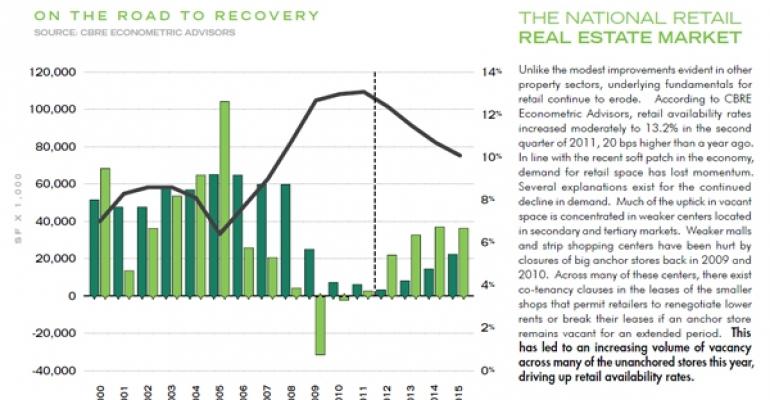A new survey by CB Richard Ellis shows that although U.S. retailers are generally more cautious about the current market environment, 59 percent plan to expand their stores due to lower rental rates.
CBRE’s second annual Shop Talk: A Retailer’s Perspective survey, which was conducted during June and July of this year, asked retailers across the country about expansion plans, lessons learned from the recession, ongoing concerns and what they foresee for the future.
The survey’s participants were mostly national (58 percent), followed by global (26 percent), regional (15 percent) and local (1 percent). The retailers surveyed cover the full range of retail real estate, including urban, lifestyle center, regional/power centers, strip/in-line and neighborhood/community tenants. The survey also covered major retailer categories including apparel, banks, books and music, general merchandise, grocery, restaurant, sporting goods and personal services.
According to the survey, only 27 percent of retailers currently view the economy as improving, compared to 35 percent last year. However, looking ahead, retailers are more optimistic: 45 percent see the economy as stable compared to 35 percent last year; and 27 percent of retailers feel that recovery has already occurred within their specific market. Only 25 percent see the recovery as taking 18 months or longer, and just 17 percent see the economy as having weakened further.
A majority of respondents (75 percent) rank the West as the best market for retail growth. The Mountain and Pacific Northwest regions recorded the lowest scores at 32 percent and 33 percent, respectively. The New York Tri-State region logged in at 58 percent, followed closely by the Southeast (56 percent) and the Mid-Atlantic (53 percent); with the Midwest and New England falling in the middle range at 42 percent each.
When asked what type of risks might impact their retail businesses in 2011, 80 percent of respondents answered unemployment, followed by consumer confidence (79 percent), higher food and energy costs (68 percent), and the housing market (51 percent).
Current rental rates are generally having a positive impact on new store expansion plans. Of those surveyed, 59 percent said they plan to open more stores due to lower rental rates; 31 percent said that because rates are up, they are being more selective; and 9 percent claimed no impact. The number of retailers who say they have been able to negotiate tenant improvements with their landlords has risen to 94 percent from 73 percent in 2010.
Retailers are generally optimistic about their businesses’ futures, with the number of retailers expecting to expand their number of locations rising to 92 percent from 82 percent in 2010; of those looking to expand, 80 percent are not considering changing retail formats.
The Internet’s impact on retailers over the past year has been mixed, according to the survey. In regard to competition with online shopping, 51 percent of retailers said they have not experience total sales moving online. For the 49 percent of retailers who did see sales moving online, the shift to online sales was 0 to 25 percent. Many respondents (79 percent) said they do not use retail Web sites like Groupon to increase sales; however, 93 percent of the retailers use social networks such as Twitter and Facebook to help brand and market their products.
Phil Voorhees, a senior vice president of CBRE’s Los Angeles-based National Retail Investment Group, expressed optimism about U.S. retail’s future in a prepared statement. “Nearly 4 years into this downturn, much of the damage at property level has already occurred,” Voorhees said. “Many tenant rents have been reset, and weaker tenants have failed. Whether or not we’ve reached the true ‘bottom’ remains to be seen, but our clients feel enough of a correction has taken place to start returning to the market.”


